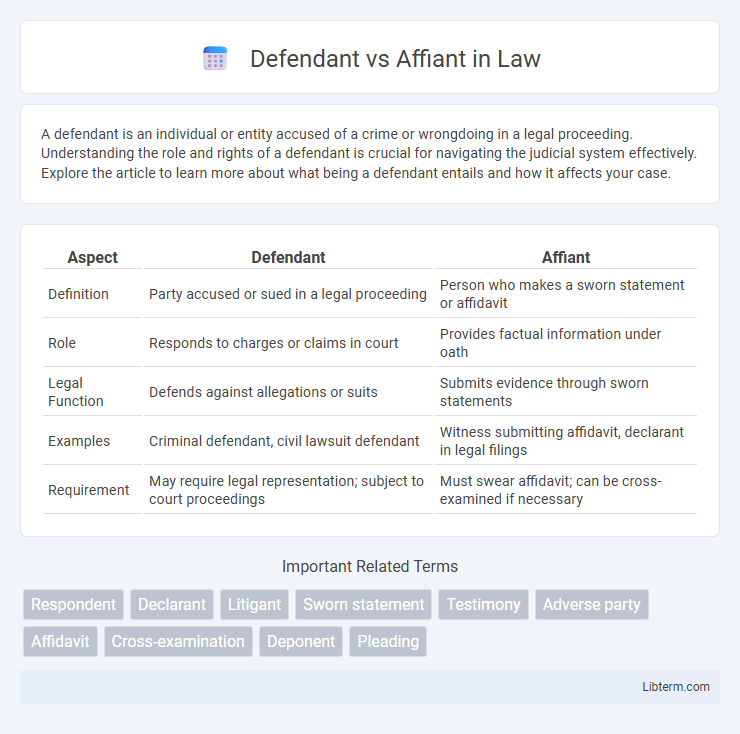A defendant is an individual or entity accused of a crime or wrongdoing in a legal proceeding. Understanding the role and rights of a defendant is crucial for navigating the judicial system effectively. Explore the article to learn more about what being a defendant entails and how it affects your case.
Table of Comparison
| Aspect | Defendant | Affiant |
|---|---|---|
| Definition | Party accused or sued in a legal proceeding | Person who makes a sworn statement or affidavit |
| Role | Responds to charges or claims in court | Provides factual information under oath |
| Legal Function | Defends against allegations or suits | Submits evidence through sworn statements |
| Examples | Criminal defendant, civil lawsuit defendant | Witness submitting affidavit, declarant in legal filings |
| Requirement | May require legal representation; subject to court proceedings | Must swear affidavit; can be cross-examined if necessary |
Understanding the Roles: Defendant vs Affiant
The defendant is the person accused of a crime or sued in a civil case, responsible for responding to the charges or claims presented by the plaintiff or prosecution. The affiant is an individual who provides a sworn statement or affidavit, serving as a source of evidence or testimony in legal proceedings. Understanding these roles is crucial as the defendant faces the legal consequences while the affiant supports the case through documented declarations under oath.
Legal Definitions: Defendant and Affiant Explained
A defendant is an individual or entity against whom a lawsuit or criminal charge is filed, required to respond to allegations in a court of law. An affiant is a person who provides a sworn statement or affidavit, affirming the truth of the documented facts under oath. Understanding the roles of defendants and affiants is crucial in legal proceedings for clarity in responsibilities and evidentiary contributions.
Key Differences Between Defendant and Affiant
The defendant is the individual or entity against whom a lawsuit is filed, responsible for responding to the plaintiff's claims in a legal proceeding. The affiant is a person who swears to the truth of a written statement or affidavit, providing sworn testimony used as evidence in court. Unlike defendants, affiants are not necessarily parties to the case but contribute factual information under oath to support legal arguments.
Responsibilities of a Defendant in Court
A defendant is responsible for responding to legal charges, presenting evidence, and defending against claims in court. They must attend all required hearings and comply with court orders throughout the litigation process. Unlike an affiant, who provides sworn statements, the defendant actively participates in the trial and may be subject to cross-examination.
Duties and Significance of an Affiant
An affiant is a person who provides a sworn statement or affidavit, responsible for affirming the truthfulness of the facts presented under oath, which carries legal weight in judicial or administrative proceedings. Unlike a defendant who responds to charges in a lawsuit, the affiant's duties center on accurate and honest declaration of facts to support evidence or claims. The significance of an affiant lies in the credibility and reliability their sworn testimony brings, often influencing court decisions and legal outcomes.
How Defendants and Affiants Interact in Legal Proceedings
Defendants respond directly to allegations and claims made in legal proceedings, while affiants provide sworn statements or affidavits containing facts relevant to the case. The interaction occurs when affiants' affidavits serve as evidence that defendants can use to support their defense or challenge the plaintiff's claims. Courts rely on affiants' credibility and the content of affidavits to evaluate the validity of a defendant's position during hearings or trials.
Importance of Affidavits in Cases Involving Defendants
Affidavits play a critical role in legal cases involving defendants by providing sworn statements that can corroborate or challenge evidence presented in court. These documented declarations enhance the reliability of testimony, helping judges and juries make informed decisions based on verified facts. Their importance is underscored in motions, hearings, and trials, where affidavits offer a clear and concise account vital for establishing credibility and factual accuracy.
Legal Rights of Defendants Versus Affiants
Defendants possess constitutional rights such as the right to legal counsel, the right to remain silent, and protection against self-incrimination, ensuring a fair trial process. Affiants, who provide sworn statements or affidavits, hold the responsibility of truthfulness under penalty of perjury but do not gain those same procedural protections as defendants. Legal rights of defendants primarily center on safeguarding due process, whereas affiants are obligated to provide factual evidence without the privilege of legal defense afforded in court proceedings.
Common Misconceptions About Defendants and Affiants
Defendants are individuals or entities accused of a crime or lawsuit, while affiants are persons who provide sworn statements or affidavits in legal proceedings. A common misconception is that defendants and affiants have similar legal roles, but defendants face allegations and potential penalties, whereas affiants serve as witnesses by offering factual declarations under oath. Understanding the distinction clarifies their different responsibilities and levels of involvement in judicial processes.
Defendant vs Affiant: Implications for Legal Outcomes
Defendant and Affiant hold distinct roles in legal proceedings, with the Defendant being the party accused in a lawsuit or criminal case, while the Affiant is an individual who provides a sworn statement or affidavit. The implications for legal outcomes hinge on the Defendant's obligation to defend against charges or claims, contrasted with the Affiant's role in supplying critical evidence under oath. Understanding the differences influences case strategy, evidentiary weight, and the overall direction of judicial decisions.
Defendant Infographic

 libterm.com
libterm.com